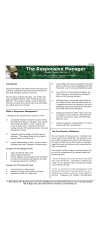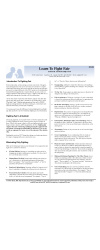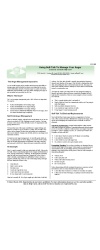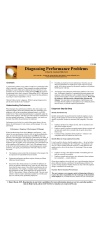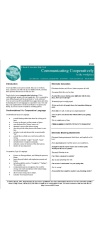Communicating Credibly
Understanding From The Inside – Understanding From The Outside
We all think we know how government works. I thought that, at least until I joined the government as an organizational and development consultant some years ago.
I’d always had an interest in politics, being reasonably educated. However, I quickly realized that my first task was to observe and learn about this new “culture” where methods and procedures were quite different than in the private sector.
And, yes, I had some stereotyped views of government, some of the same ones most people have.
I was fortunate enough to be a fly on the wall at meetings where either senior government officials attended, meaning, I wasn’t high enough in the hierarchy to have the heavy executive and management responsibilities of those in those positions, but I got to observe and learn.
All this to say that my opportunity to be a part of, and inside a process or organization allowed me to learn how things really got done, the trials, tribulations and realities of that world.
No matter how many books I might have read, or how many people I might have knows in government, so long as I was OUTSIDE government, I’d only have an outsider’s limited understanding of that world.
Credibility: Knowing The Limits Of Your Understanding
The difference between understanding born of being on the inside, and the understanding gleaned from “outside” is huge. And knowing the difference and tuning your communication accordingly is a critical part of establishing credbility on a topic. More important it helps you avoid saying things that those on the “inside” know are just dead wrong.
Example: Trump’s Campaign and Presidency
Putting aside partisan politics for a moment (which is difficult for many), we can see the confusion between “understanding from inside” and “understanding from outside”.
I don’t know if Trump is a smart guy or not. I do know that his understanding of government, including what he can do and cannot do, comes from outside government. In the hands of a humble main eager to learn, that could be a breathe of fresh air, and I suspect that’s one of the hopes many of the electorate had when they elected him. That he’d bring a new way of conducting government business.
But Trump isn’t humble. So, what we have, both during the campaign and during the early months of the Presidency is more gaffs, errors in statements, attempts at legislation the courts quashed, and a lot more.
That can be directly attributable to Trump’s lack of knowledge about the specific roles of the various parts of government, and really, having little clue about how government works, and how to make it work, born on “experience from the inside.
Example: The Guy Who Knows About Writing Books But Never Has
There’s a fellow who has some article credits, and is trying to sell his courses related to writing. He’s been on the inside of freelancing, and print media publishing.
He has repeatedly written that writing books isn’t financially practical, and that he “knows guys” who wrote books and made almost nothing, certainly not enough to justify the time involved in writing a non-fiction book.
While this is an opinion, he often states his position as fact. The problem is his understanding of the process of writing a profitable books is from OUTSIDE. Worse, he makes an error of logic; that because what he has seen from the outside is an absolutely accurate observation that one would have from the INSIDE.
Lacking direct experience gleaned from actually writing and publishing a book, he has to rely on a very few others who have failed, and concludes that except for rare exceptions, it’s not worthwhile.
It makes me cringe. For two reasons. First, I can say from the INSIDE, having written and published books, and profited signicantly (and I’m just a regular guy), that he’s wrong to make these kinds of general statements. Whle it’s true most books don’t make a lot of money, I can tell you that not only have I made a lot of money from my books over time, but I know a lot of my colleagues have also done so.
Second, this false conclusion may discourage others who might otherwise try their hands at writing their own books.
People need accurate information from the inside, and from people who have succeeded, and not from the outside and/or from people who have failed, and believe everyone else will fail too.
In terms of credibility his belief that he understands the book publishing industry and his loud claims that one can’t make money, makes him look foolish, particularly to those of us who have lived inside that world, and know differently.
Many More Examples Available
That’s just two obvious examples of people who assume their outsider understanding somehow qualifies them to say and do things, without having a very fundamental understanding based on being “on the inside”.
The guy who offers small business advice without actually having started a business. The person who tells us about the value of having a website without actually having created one from scratch, or succeeded in building a high traffic site. I’m sure you can come up with more examples. Even restaurant critics, film critics and book reviewers!
There’s no sin in having outside knowledge. Some good can come from that, because it can provide a fresh perspective, provided the source REALIZES the limits of his or her understanding.
Some Suggestions Regarding Your Credibility
- Put aside your desire to be seen as an expert, and work in “learner” mode.
- Ask questions, and don’t make sweeping statements based on a lack of “inside understanding”.
- Realize that no matter how much you’ve read, or that you know “some guys” who are on the inside, your outsider knowledge is DIFFERENT from what one learns from actually going throught he experience.
- Tailor your comments accordingly. Learn the difference between stating something as a fact and stating something as an opinion. You can have an opinion about anything, and you may be wrong or right; it’s always debatable. When you state an opinion as fact AND you base that on your “outside understanding” you look like an idiot.
- Realize that if your understanding of something is based on talking to a very few people on the inside, particularly those who have failed, you are going to have a very skewed perception. If you can’t be “inside” at least take the time to talk to successful and unsuccessful people in quantity, who are on the inside. That’s how you learn, and broaden your knowledge about things that you can’t experience directly.

